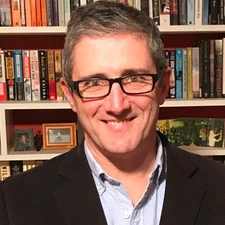Chris Marone

The 2019 Louis Néel Medal is awarded to Chris Marone for seminal contributions to the understanding of fault mechanics and earthquake generating processes, and for innovation in experimental techniques and apparatus development.
Chris Marone is an outstanding scientist who has made seminal contributions to the study of fault mechanics and earthquake generating processes, evidenced by a large number of highly influential publications that have repeatedly changed and steered thinking.
Marone has also introduced many major innovations in experimental techniques and the design and development of apparatus aimed at elucidating the processes involved. Combined with a solid theoretical and analytical approach to questions, including the incorporation of geological and micro-structural observation of fault rocks, this has enabled Marone to play a major role in relating laboratory research to earthquake seismology, and in integrating fault mechanics into earthquake physics as a whole.
His creativity and altruistic sharing of knowledge have opened the door to many key discoveries in the field of earthquake and rock physics. These include: the documentation of the full spectrum of fault slip behaviour, from aseismic creep and slow slip, to dynamic stick-slip in the laboratory, with important validation of theoretical hypotheses, including rate and state friction; determining the granular mechanical and poro-mechanical properties of deforming rocks; the elucidation of fault healing rates and scaling of properties from lab to field; identification of the role of shear fabric and clay minerals on the frictional strength and constitutive properties of fault rocks; the observation of dynamic earthquake triggering by acoustic wave perturbations along experimental faults; and the development of machine learning techniques to test laboratory earthquake forecasting power from observed precursory signals.
Marone is a natural and active leader in his field, who has also collaborated widely and generously with a vast network of colleagues, including many in Europe. His passionate curiosity for how faults and earthquakes work, his open door policy to allow others access to his lab facilities, and his innate ability to interact with colleagues in a supportive, interactive and engaging way, has contributed greatly to the field, and to empowering others to contribute.
He has provided consistent support and encouragement to early career researchers, and has supervised and mentored a large number of graduate students who have gone on to successful careers, including many who now occupy prominent positions in academia and industry. He has also provided consistent and effective service to the wider rock physics community by service on important committees, by convening many conference sessions, and by acting as an ambassador for his subject.
This outstanding combination of contributions to the field of rock physics and geo-mechanics make him a worthy recipient of the 2019 Louis Néel Medal.
